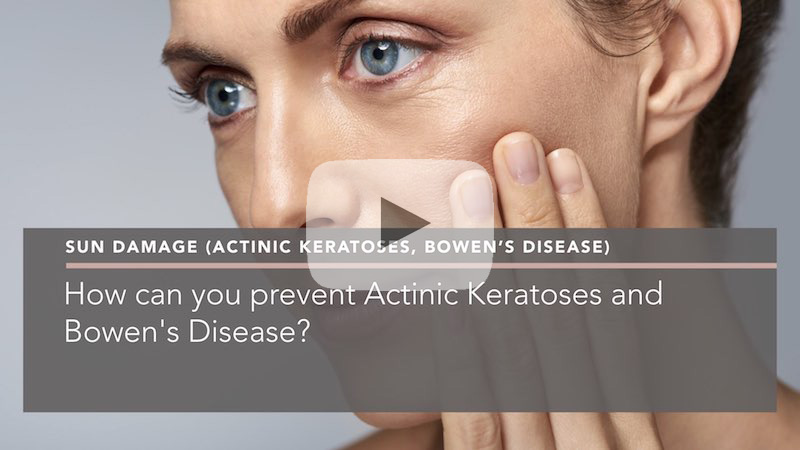Interview transcription:
We interviewed Dr Penelope Pratsou to find out how to prevent Actinic Keratoses and Bowen’s Disease.
The obvious preventative measure would be to avoid sun exposure. Are there any other things one can do?
Penelope Pratsou: There are only really two main reasons why you would get this type of sun damage and that’s having fair skin and this type of sun exposure. There’s very little that you can do with regards to your fair skin, so I’m afraid it is a simple matter of taking the necessary sun precaution measures. I’m not saying by any means that you need to change your lifestyle altogether because I’m the least likely person to tell you not to go out and play golf or to go out running or to go sailing, or any of those activities that a lot of my patients actually continue to enjoy. It’s simply a matter of knowing how to protect your skin and, unfortunately, it always boils down to protecting your skin from the sun.
I know it’s very common to mention that fair-skinned people are more at risk but, presumably, that doesn’t suggest that people with darker skin are at no risk.
Penelope Pratsou: It is possible for you to have darker skin and still get these areas of sun damage. I would say it’s unlikely if you have very dark skin to get these areas of sun damage because your skin is well-protected with regards to melanin. Therefore, I’m unlikely to see actinic keratoses and Bowen’s disease in those individuals, but it’s not uncommon to see people of the Mediterranean origin or even from the Indian subcontinent that can have those areas of sun damage. This is probably because of their level of sun exposure in those countries to some extent. I would advise the same sun precaution measures in those individuals as well.
I would also want to make sure that there’s no other reason why they’re developing this sun damage – especially if you do have darker skin – because it could be that there is an element of immune suppression which we can find in certain individuals. This is usually evident from your previous history and it is possible to have it with the majority of skin types, but far more likely in fairer skin types.
If you have any of the symptoms or conditions that we’ve just discussed, we invite you to book a consultation with Dr Penelope Pratsou where she’ll be able to assess your condition and give you a suitable treatment plan.

About the author
Dr Penelope Pratsou | Consultant Dermatologist
MBChB, MRCP (UK) (Dermatology)
I’m Dr Penelope Pratsou, a skilled independent Consultant Dermatologist based in Berkshire. I have specialist expertise in the diagnosis and management of all skin cancers, and in performing mole checks. I’m a trained skin surgeon and remove skin cancers, moles, skin tags, cysts and warts.
I also have invaluable experience in dealing with all skin conditions, from the common skin complaints of acne, rosacea, eczema and psoriasis, to the rarer and more complex skin problems, having seen it all through years of NHS work.
After I obtained my Membership to the Royal College of Physicians, I undertook rigorous specialist training in dermatology, before being appointed as a Consultant Dermatologist at the Royal Berkshire Hospital, Reading. There, I helped set up and lead a busy clinic for the diagnosis and treatment of suspected skin cancer. I was also actively involved in supervising and training both dermatology and GP trainees.
Alongside my increasingly busy private practice, I have maintained an NHS practice in Oxford in order to continue to engage with challenging cases and to develop my specialist interest in skin allergy.



